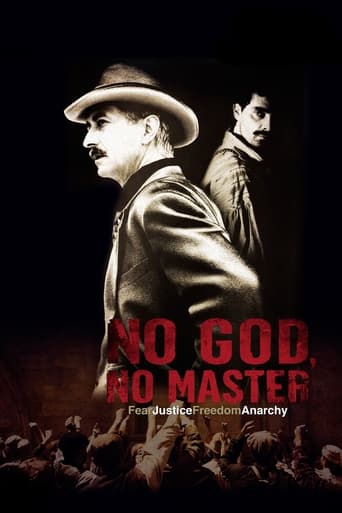bibliub
Valiant attempt to a portrait of class struggle, government corruption and alliance with industrialists, radicalization of workers against inhumane labor conditions. interesting weaving of the scapegoating of sacco and vanzetti. dangerous portrayal of luigi galleani, who the director accuses of collaborationism with the palmer administration. why assign the role of traitor to a historical character who was certainly an extremist, but not a collaborationist? there's no doubt infiltrators were active and successful, but galleani is too famous to be so grossly misrepresented. also, the music-->unbearable
jimsboatworks
This is a nice period piece that was a married by the distortion of facts about Galliani and his anarchy thugs and their roll in bombings and robberies in 1919-1920. Let's establish a few facts not touched on or distorted in the film- The first batch of bombs in April 1919, numbered 36 bombs, they were intended to be delivered on May Day (Communist Workers holiday). Half were not delivered to insufficient postage. Only one other detonated when a Georgia Senator's housekeeper opened the package, she's was horribly injured. No boy on a bike was blown up as the movie shows. On June 2 1919, eight 25lb dynamite and shrapnel bombs were blown up simultaneously. Addressees included government officials who had endorsed anti-sedition laws and deportation of immigrants suspected of crimes or associated with illegal movements, as well as judges who had sentenced anarchists to prison. These bombs only succeed in killing a night watchman. The film doesn't mention the 1910 bombing of the LA Times, which is actually the first terror bombing in the US, not the 1920 bombing of Wall Street, another deliberate lie in the film. The way they try to show that they were struggling workers all innocent of attempting to kill officials and some corporate board members is just sad. The attempt at making the two robbers look heroic giving their speeches at their sentencing is pitiful attempt at communist spin. Modern socio-communist filmmakers ruined what could have been a great factual historic drama. Too bad.
LeonLouisRicci
So Many Historical Headlines to Cover, so Little Time, and so Little Money to make the Movie. The Story of Palmer's Raids, the Attorney General's Attempt in 1919 to Mass Deport Thousands of Immigrants before such a Thing was made Illegal, is a Story that is just too Enormous to Tell in Ninety Minutes.Add to that the Backstory of Fat Cat Indifference and down right Worker Oppression is Given some Screen Time but again is Light on Detail and Heavy of Speechifying. But if this Little Movie can do Anything it can Draw Attention to a somewhat Forgotten Time and Place in America's Early Twentieth Century History and might Propel Folks to do some Research.The Subject matter and the Situation has Not Lost any of its Relevance and can be Seen as a Mirror to Things that matter just as Much Today. It is an Engrossing Story and is Played Well enough to Entertain as well as Enlighten. This was a Time when Workers were Definitely Exploited and Sought Collective Bargaining. It Must Also be Said that the Workers were Being Exploited from All Sides and there was Blood on Everybody's Hands.Worth a Watch for its Historical Relevance and as a Primer for more Investigation into the Struggles of the Time and a Sordid Situation that can Never be Forgotten, Lest We Repeat. Oh, Wait, We Have. So that makes this Movie even more Important.
frankf-10
OK, I love period pieces and tried to like this one despite the obvious budget constraints of No God, No Master as it moved along, but the no- nuanced presentation of the historical characters made it a task. The simplistic and fiery speech of Galleani (face lit from underneath to emphasize "evil") was a prime example. Flynn in the middle of a melee of activists and cops as his boss (who instigated the fight) looks on passively, is another. Say what you will about baddie Palmer, he seemed to have an awful lot of patience with the uncooperative Flynn.Just taking it as a movie - a "work of art" as opposed to reportage - it failed to satisfy. The all too many plot lines were hard to follow and hard to buy into. The "romance," in particular, was just too cute and convenient and made some of the final scenes pretty screwy. But maybe my attention drifted and I missed some details. Would that I could convince a smart friend to watch this movie and answer my questions, because I am befuddled and left to wonder...Why was the boy taken?What are we supposed to conclude when Flynn finds Louise Berger living in a nice apartment, rather than a tenement hovel?Is Flynn partially blind? If not, how come such a brilliant couldn't see the car following him during his ride in the country?How did agent Swanson beat him to the hideout? Who the !#!!^>< is agent Swanson?Why was the boy in the barn? Are the anarchist bad guys also pedophiles?If Flynn is such a liberal and is so disgusted by Palmer's actions, why doesn't he want to talk to the press when the boss first makes the offer?Why in blazes was the boy in the barn?


